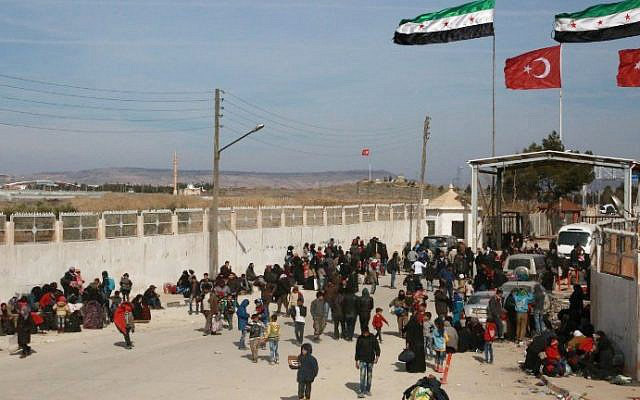NEW YORK: With the current UN Security Council’s exceptional authorization for humanitarian aid delivery through the last remaining border crossing into northwest Syria set to expire on July 10, the UN Syria Commission of Inquiry warned that it would be a “failure of the highest order” if the council failed to extend the life-saving operation.
“As the country faces its worst economic and humanitarian crisis since the start of the conflict, the international community must safeguard existing, life-saving cross-border assistance and increase their funding pledges to support this aid,” said a commission statement, which also expressed alarm at what it called a “trajectory of consistent narrowing of the cross-border humanitarian aid delivery.”
When deliveries of international aid to Syria began in 2014, the Security Council approved four border crossings. In January 2020, permanent member Russia used its power of veto to force the closure of all but one, Bab-al-Hawa.
Moscow argues that international aid operations violate Syria's sovereignty and territorial integrity.
Security Council discussions about the issue often prove difficult, with Russia and China consistently insisting that all humanitarian aid deliveries require the consent of the Syrian authorities.
Opposing views among council members last week on the need to extend the cross-border mechanism have sparked concern among humanitarian agencies, as the crossing so far has guaranteed access to desperately needed aid for millions of Syrians since 2014.
“It is a moral abomination that a Security Council resolution was in itself deemed necessary to facilitate cross-border aid in the face of consistent violations — by the government of Syria and other parties — of their obligations under international law to allow and facilitate humanitarian relief for civilians in need,” Paulo Pinheiro, chair of the UN Syria Commission, said.
The July 10 renewal vote comes as humanitarian needs throughout Syria are at their highest since the start of the war 11 years ago.
The UN estimates that 14.6 million Syrians are now in need of aid. Across the war-ravaged country, 12 million people face acute food insecurity, a staggering 51 percent increase since 2019, amid a conflict in Ukraine that has sent food prices skyrocketing and threatened supplies of wheat and other commodities.
In opposition-held northwest Syria, conditions are deteriorating due to continuing hostilities and a deepening economic crisis. About 4.1 million people there, mostly women and children, depend on aid to meet their basic needs.
Cross-border operations authorized by the Security Council allow aid to reach around 2.4 million people every month.
The commission said in its latest report that this lifeline is vital to the population in northwest Syria, adding that while some aid is delivered cross-line from within Syria, these deliveries contain much smaller, insufficient quantities and are exposed to attacks along a dangerous delivery route that crosses active front lines.
During its 11 years of investigating the conflict, the commission has documented that both the government and armed groups have repeatedly used humanitarian aid as a political bargaining chip, often deliberately withholding it for specific populations, particularly those under siege.
The commission also maintains that across all territories of Syria, staff members of humanitarian organizations constantly run the risk of being harassed, arbitrarily arrested and detained.
Commissioner Hanny Megally said: “Parties to the conflict have consistently failed in their obligation to allow and facilitate rapid and unimpeded passage of humanitarian relief for civilians in need across Syria. It is unconscionable that the discussion seems to focus on whether to close the one remaining authorized border crossing for aid, rather than how to expand access to life-saving aid across the country and through every appropriate route.”
Earlier this month, humanitarian aid organizations sounded the alarm at an EU-hosted Brussels VI Conference on Syria.
“The funds for humanitarian assistance are simply not sufficient to address the needs and protect the Syrians right now,” Pinheiro said.
“The international community cannot now abandon the Syrian people. They have endured 11 years of devastating conflict that has inflicted unspeakable suffering. They have never been more impoverished and in need of our help.”




























